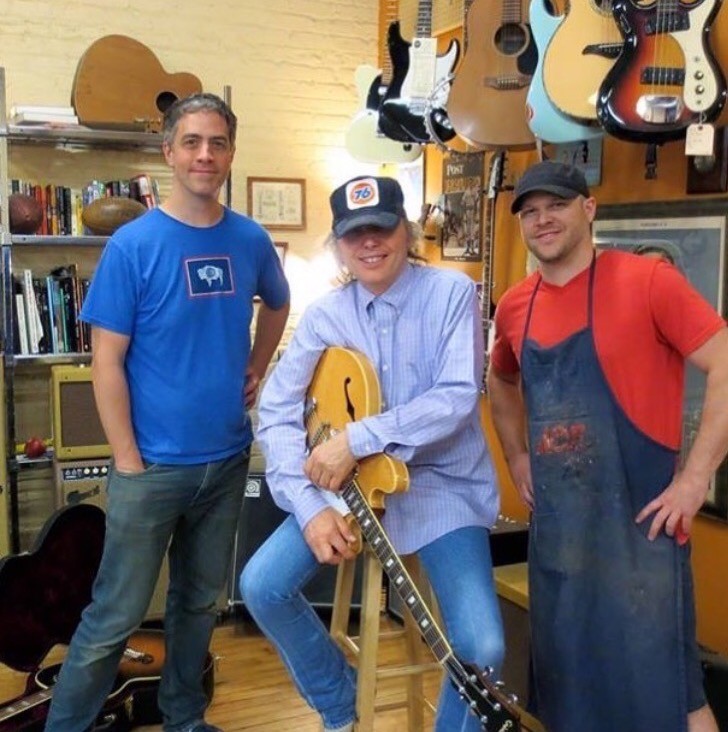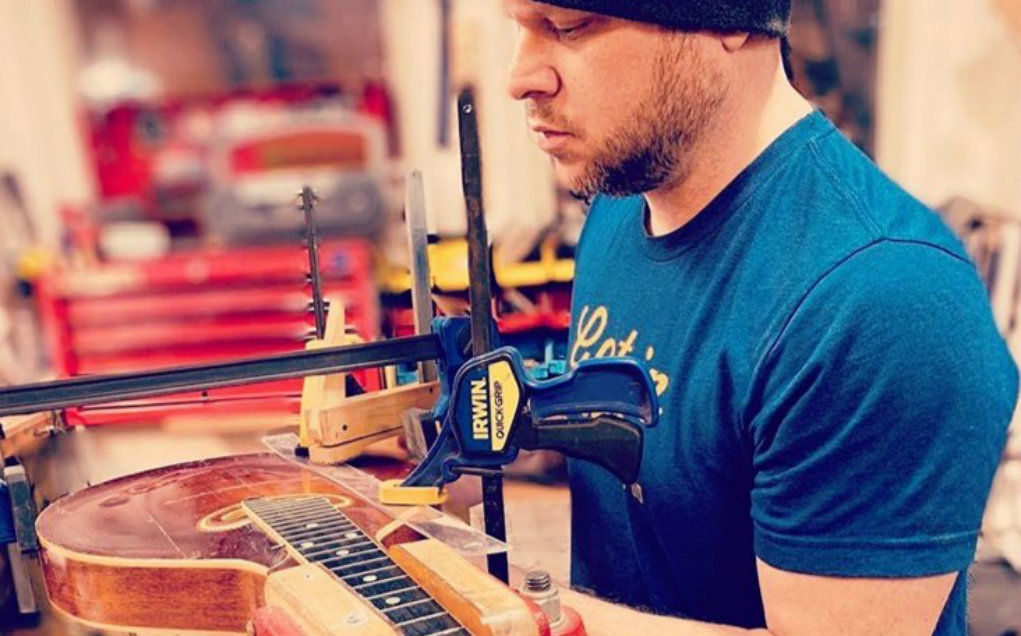Dan Wolf, co-owner of Chicago Fret Works, has worked on thousands of guitars over the last 22 years in Chicago alongside partner Steve Baker. Players, collectors, and enthusiasts from around the country have turned to Dan for their most challenging and difficult guitar repairs. He began learning his craft in 1996 at Red Wing Technical College (Now Minnesota State College- Southeast Technical) in Red Wing Minnesota. Dan has worked guitars from the following artists: Wilco, Dwight Yoakam, Red Hot Chili Peppers, Smashing Pumpkins, and Dave Specter.

Brant Buckley:
How long have you been fixing guitars and how did you get into musical instrument restoration?
Dan Wolf:
It started with going to Red Wing Technical College. Believe it or not it’s a guitar building college. Guitar building schools are much more popular nowadays. It’s an accredited college where you learn how to build guitars. I went there for a couple of years after high school. I had a great time there. I was thinking I was going to be doing it for fun and perhaps afterwards go to a university and get a college degree and try to make my mom happy. It was the first time I was ever really good in a classroom. You learn how to build guitars which is a completely different world than repairing guitars. It just kind of morphed into repair work. I lived in Quebec City for a few months trying to build guitars with a builder by being an apprentice. It didn’t really work out and I missed living in Chicago and I moved back. My roommate at the time talked me into going into Guitar Center and seeing if they needed a repairman. I was thrown into the world of guitar repair and learning on the fly. It seems like twenty years have flown by.
When did you open Chicago Fret Works?
Steve Baker and I opened up the shop in early 2008. We both worked at another shop in town. I worked there for close to eleven years and Steve worked for six years. We became friends outside of the shop and became comfortable enough discussing the possibility of opening up our own shop. We just jumped off the cliff. It was crazy, scary, and exciting. We did it and haven’t looked back.
What’s the coolest guitar that has come through the store?
We do work for Jeff Tweedy of Wilco. He has an enormous vintage guitar collection. Steve and I really like vintage stuff from the 60’s and 70’s. If instruments from the 50’s come in that aren’t in terrible shape, that’s extra fun. We are lucky to work on a lot of guitars through Wilco and other customers. They keep us busy with a heaping supply of cool guitars to work on including a 1952 Les Paul Goldtop. These guitars are close to being museum pieces because of their rarity and significance in the electric guitar world. A lot of old Gibsons and Martins from the 50’s and 60’s have come in. Those are our favorite guitars. It’s funny the old vintage guitars are the most fun, coolest, and happen to be the easiest to work on because they’re designed to be taken apart to some degree. Especially the acoustic stuff. Modern guitars aren’t designed to be taken apart as much as the vintage stuff because they are almost disposable. Like everything else in the world, they used to make them better. As a repair tech whenever I see a case that I know has a vintage guitar in it, I get pretty excited because I know it’s going to be fun and it’s also going to be easy to work on. People who built these guitars had in mind they would be repaired in the future.
What’s the hardest part when dealing with fixing vintage instruments?
The hardest part about fixing vintage instruments is making sure you keep them as original as possible. Originality is a huge thing that is drilled into our heads when we are learning how to do this stuff. It’s a big no no to do certain things like refinishing vintage guitars or replacing unnecessary parts. It sounds easy enough but when something needs to get repaired it becomes tricky to make sure everything stays as original as possible.
How many guitars do you work on each day? What’s a typical day look like?
I would guess we complete anywhere between 10-20 guitars a day. My typical day revolves around managing my employees and making sure business gets taken care of. Along with my business partner Steve we share the duties. I take on the majority of teaching employees how to do certain things and they are all at different levels and they all do different types of jobs. I make sure things run smoothly. Every single day some surprise comes up and it’s not always a fun surprise. Steve and I either have to put out a fire or react to something that unexpectedly happened. We like to talk to customers and get to know them and their needs. I do have my own projects that I am working on that are the more difficult ones we do. I always have three to four really difficult projects going on. I try and split the time with everything else I mentioned.
If there is one guitar (artist’s guitar) you could work on which one would you choose and why?
We get that all the time and I always never know what to say. Wilco is a friend of the shop and we also like their music. We are ecstatic that we get to work on their guitars. If you were to tell me ten years ago I was going to be working on so many of Wilco’s instruments, I would be really psyched. We don’t take it for granted. I don’t think my favorite artists will ever make it in the shop. I am a big fan of Frank Black, Stephen Malkmus and A.C. Newman of The New Pornographers. If these guys came in the shop I would be pretty damn excited to work on their guitars.
What else do you want to accomplish?
I am pretty focused on my employees becoming really good at this. Teaching these guys how to do this work is my motivation right now. Money isn’t and shouldn’t be a big motivator in this line of work. I want to continue teaching my employees to be the best guitar tech they can be. That is really important to me. It is really rewarding work that you can’t get in other fields: finishing products, seeing a happy customer get a guitar back that they had sentimental attachment to, and working with your hands. All of the people who do this kind of work are artists whether they know it or not. Refinishing a guitar to make it look like it is from the 50’s and 60’s and recreating everything is an art form. You need to be into art to enjoy this job.
Chicago Fret Works
*Photos by Steve Baker

